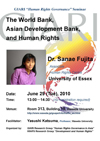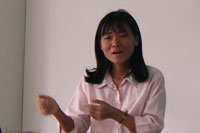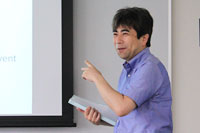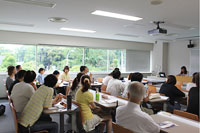Social Integration and Networking
Research:Seminars/Workshops
[GIARI“Human Rights Governance”Seminar] The World Bank, Asian Development Bank, and Human Rights / Dr. Sanae Fujita
2010.06.29
GIARI“Human Rights Governance”Seminar
- Title: The World Bank, Asian Development Bank, and Human Rights
- Lecturer:Dr. Sanae Fujita Associate Human Rights Centre University of Essex
- Date: June 29 (Tue), 2010
- Time: 13:00−14:30 (no registration required)
- Venue: Room 313, Building 19, Waseda University http://www.waseda.jp/gsaps/info/traffic_en.html
- Facilitator: Yasushi Katsuma, Professor, Waseda university
- Organized by: GIARI Research Group “Human Rights Governance in Asia” WIAPS Research Group “Development and Human Rights”
 poster [316KB]
poster [316KB]
Summary
The World Bank, Asian Development Bank and Human Rights (Sanae Fujita)
The human rights problems regarding the World Bank (and the IMF) have been discussed in several UN human rights meetings. In reply to criticisms, the World Bank has quoted from its Articles of Agreement, which specifies “The Bank and its officers shall not interfere in the political affairs of any member…. Only economic considerations shall be relevant to their decisions….” The Bank’s interpretation of both “political affairs” and “economic considerations” and its attitude towards human rights have changed dramatically during the past 40 years.
In the 1960s (when the issue of the World Bank and human rights was raised in the UN for the first time) the World Bank avoided any involvement in human rights discussions. At this stage the World Bank used its Articles to fend off criticisms of involvement with such regimes by classifying human rights concerns as ‘political’ and therefore something which should be excluded from consideration.
In the 1980s, the World Bank discovered a human rights dimension of development due to external criticisms of its activities, especially of the Structural Adjustment Programs (SAP) that started in the 1980s. To such criticisms, the World Bank emphasised that nations were responsible for any negative impact on the human rights situation caused by SAPs, but the Bank failed to acknowledge its own responsibility.
In the 1990s, the World Bank recognised the linkage between development and human rights, and emphasised its contribution to human rights. At this stage the Bank emphasised its contribution to making lives better, but it is not wholly clear that it understood a responsibility regarding human rights included not only delivering the “goods”, which are the contents of rights, but also creating a framework which guarantees that delivery.
Since the Vienna Declaration on Human Rights (1993), which recommends coordination between UN bodies and specialized agencies to assess the impact of their strategies and policies on the enjoyment of all human rights, UN human rights organisations have begun to contact the World Bank. Such outreach has been influential to the Bank’s attitude toward human rights and it has begun to talk more openly about this topic.
In comparison with the Word Bank, little research has been done regarding the Asian Development Bank (ADB) in the context of human rights although the ADB is the largest institution operating in the field of development in Asia and the Pacific. The ADB’s Articles of Agreement contains sentences identical to those of the World Bank’s declaring its apolitical character. In addition, the ADB’s projects and policies have caused human rights problems similar to those caused by the World Bank. NGOs have been criticising the ADB for these human rights problems. Just as there has been little analysis of the ADB’s attitude toward human rights, so also has the ADB’s attitude toward human rights issues, in some respects, lagged far behind that of the World Bank. On the other hand, some of the ADB’s policies such as those relating to information disclosure and accountability were more progressive than the policies of the World Bank before the World Bank amended its policy in 2009 using the ADB’s policy as a benchmark.
The World Bank, Asian Development Bank and Human Rights (Sanae Fujita)[9KB]
Photo





